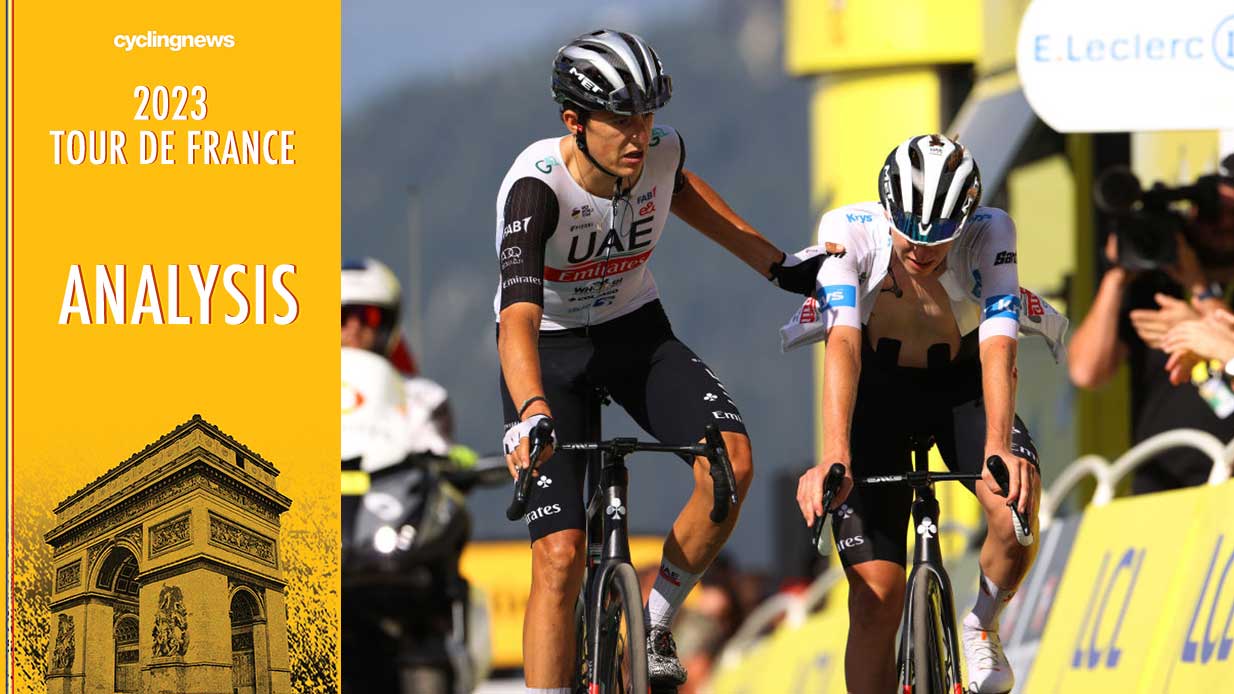
The experiment of broadcasting snatches from team radio conversations on this Tour de France had been an underwhelming one up to this point, with viewers gleaning little insight as they eavesdropped on the most banal of interactions between directors and riders. And then, on the upper reaches of the Col de la Loze, came an unexpected moment of arid truth.
8km or so from the top of the climb, where the gradient stiffened towards 9% and where the outcome of the entire race was about to be resolved definitively, the radio finally crackled into life with something of substance: Tadej Pogačar's admission of defeat.
"I'm gone, I'm dead," Pogačar told his UAE Team Emirates companions forlornly but clearly as he lost contact with the yellow jersey group. It was something like the moment Roberto Duran turned to the referee during his second title fight against Sugar Ray Leonard and said, at least per legend: "No más."
Unlike the boxing ring, there was no stopping the contest. In cycling, the cruelty continues to the finish line, and Jonas Vingegaard's Jumbo-Visma teammate Sepp Kuss was quickly deployed to turn the screw as tightly as he could to ensure there would be no way back for Pogačar. 50 metres would become five minutes come the top of the climb, and almost six by the finish in Courchevel.
For two weeks, Pogačar's duel with Vingegaard had hung beguilingly in the balance, a race of fine margins that seemed to evoke memories of Fignon, LeMond and 1989 at every turn. In the space of two days, it has suddenly morphed into the kind of procession Merckx and Coppi used to inflict upon their subjects during their imperial phases.
This year as last, Vingegaard and Pogačar have been in a class of their own at the Tour, zooming away from the peloton at will whenever the road climbs and even indulging their running battle by exchanging blows on flatter stages. In the final reckoning, however, Vingegaard has proceeded to give Pogačar a beating that surpasses even the Slovenian's own domination of the 2021 Tour de France.
When the race broke for its second rest day in Saint Gervais on Sunday evening, Vingegaard was just ten seconds ahead of Pogačar in the overall standings, and it was hard to envisage any other scenario than the Tour being decided by a breathless, final rally on the penultimate day in the Vosges.
After Vingegaard put a startling 1:38 into his rival in the 22.4km time trial to Combloux on Tuesday, however, this Tour was suddenly at match point, and the Dane emphatically ended the contest on the Col de la Loze on Wednesday, gaining almost six minutes on Pogačar to extend his overall advantage to some 7:35. Five days from Paris, the race for yellow is over.
Given how evenly matched the pair had been to this point, the sudden chasm that has formed between them is shocking, though Vingegaard offered an explanation of sorts when he took a seat for his press conference in Courchevel on Wednesday evening. The defending champion had, after all, repeatedly suggested this race would be decided by minutes rather than seconds, and now his hypothesis had been borne out in the most spectacular fashion.
"When you always go on the attack, you make yourself vulnerable and it's kind of easy for the other one to make a bigger difference," Vingegaard said, almost matter-of-factly.
In a battle of such intensity, perhaps one of the two favourites was always likely to crack before Paris. Jumbo-Visma, it seems, hoped Pogačar would punch himself out during the opening two weeks of the race before leaning on Vingegaard's powers of endurance in the final phase of the race, in a sort of mirror of a 2022 strategy that saw them discommode the previously impregnable Pogačar on the Col du Granon and again at Hautacam.
Although Pogačar was, by some distance, the best of the rest in Tuesday's time trial, he was showing some signs of strain. His old mentor Allan Peiper, for instance, wondered if he had fallen ill. "Tadej looked a bit sick. I don't know. There was something. This was not the Tadej we know," Peiper told Sporza.
The hypothesis was rejected by UAE sports manager Joxean Fernández Matxin on Wednesday, but it's certainly clear that this most pugnacious Tour had exacted a toll on his rider.
And yet, Vingegaard had delivered some early combinations of his own across the race, most notably when he put almost a minute into Pogačar on the Col de Marie Blanque on stage 5. Nor was there any indication that he was sparing himself in the second week either when he battled grimly to withstand Pogačar's repeated offensives and then scrambled to compete for bonus seconds.
Vingegaard joined Pogačar in breaking a 30-year-old record time on the Col du Tourmalet on stage 6, and they looked set to better Marco Pantani's 1997 Col de Joux Plane record at the weekend before they stalled to mark one another near the summit.
No, there was no real respite for Vingegaard throughout this most attritional of Tours, where the yellow jersey could even be seen going on the attack in the opening kilometres of the riotous stage 10 to Issoire, yet he was visibly fresher than Pogačar in the third week.
Jumbo-Visma's strategic thinking was only a part of the story, in other words. Vingegaard's other-worldly strength was ultimately the difference. The oldest Tour de France truth of them all.







